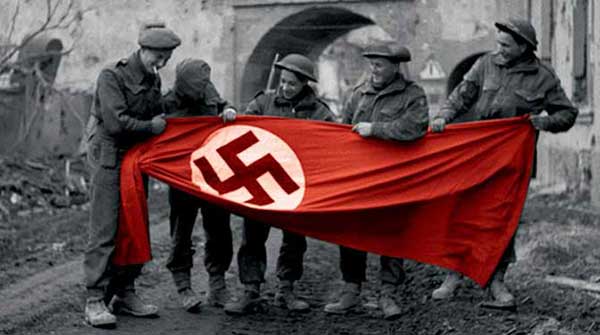During the Cold War, Canada encouraged thousands of Nazi war criminals to immigrate from Ukraine
 We are all aware that “In war, truth is the first casualty.” Truth, of course, is the antithesis of propaganda, and in a society where people think critically, what is labelled by one side as “disinformation” cannot simply be dismissed; it must be disproven.
We are all aware that “In war, truth is the first casualty.” Truth, of course, is the antithesis of propaganda, and in a society where people think critically, what is labelled by one side as “disinformation” cannot simply be dismissed; it must be disproven.
Parliament handed Russian President Vladimir Putin a gift when the entire chamber gave a standing ovation to a former Nazi soldier from Ukraine. On September 22, with current Ukrainian President Volodymyr Zelensky present, the Speaker of the House, Anthony Rota, called Yaroslav Hunka, a Ukrainian immigrant who was a member of Hitler’s Waffen SS during the Second World War, “a Canadian hero.”
When the truth about Hunka’s past came out, the consequence was what Conservative Party leader Pierre Poilievre called our country’s “biggest single diplomatic embarrassment.”
 |
| Related Stories |
| Canada underfunds its ability to hold war criminals to account
|
| Ukraine must be victorious, for all of our sakes
|
| Canada’s human rights record marred by hypocrisy
|
However, what has followed in Parliament and the media is finger-pointing and confusion rather than a quest to understand how and why such an error occurred. Rota has stepped down as Speaker, Prime Minister Justin Trudeau has apologized, and all parties represented in Parliament continue to vote for our tax dollars being used to support the Ukraine War. Should Canadians be satisfied with this conclusion?
Why would Hunka, who knew what he had done during the Second World War, agree to be publicly lauded in Parliament? Why was Rota ignorant of what Hunka represented? Why has no Canadian opposition party and no mainstream media source in Canada asked these questions?
As is often the case with propaganda, there is a grain of truth to Putin’s accusations of links to Nazism in the Canadian Ukrainian community. While most Canadians support the cause of the Ukrainian people, only one-third of us support using our tax dollars for military aid. Could this be why Canadian parliamentarians, their donors, the corporate media, and their sponsors were so anxious to avoid the questions that so many Canadians were asking?
The truth is that during the Cold War, Canada allowed and even encouraged thousands of Nazi war criminals to immigrate from Ukraine. Among them were not only Yaroslav Hunka but also Michael Chomiak, the grandfather of current Deputy Prime Minister Chrystia Freeland. Chomiak ran a newspaper that published Nazi propaganda, using a printing press stolen from a Jewish family.
Despite Freeland’s involvement in this fiasco being a seemingly taboo topic in Canada, international media has taken notice. For instance, on the U.S. news show Democracy Now, Lev Golinkin, a Jewish-Ukrainian refugee and American writer, argued that while Freeland isn’t accountable for her grandfather’s deeds, she is responsible for portraying him as a victim rather than a perpetrator. Her revisionism about her grandfather potentially misleads Canadians and obscures the truth about the most notorious genocide in human history.
Why would Rota recognize Yaroslav Hunka as a Nazi soldier when a potential future Prime Minister like Chrystia Freeland presents a skewed perspective? And with influential figures downplaying the actions of Ukrainian Nazis during the Second World War, why wouldn’t Hunka embrace an opportunity for recognition in our Parliament?
These are the important questions that the mainstream Canadian media and opposition parliamentarians failed to address, and they, too, need to be held accountable.
For a principled person, truth is nothing to fear. It may make us uncomfortable for a time, but the result is always solace and satisfaction from knowing we have done the right thing. The same is true of nations. If we are going to build a world where crimes like the Holocaust never happen, we must pursue truth without fear and let history take its course.
Gerry Chidiac specializes in languages, genocide studies and works with at-risk students. He is the recipient of an award from the Vancouver Holocaust Education Centre for excellence in teaching about the Holocaust.
For interview requests, click here.
The opinions expressed by our columnists and contributors are theirs alone and do not inherently or expressly reflect the views of our publication.
© Troy Media
Troy Media is an editorial content provider to media outlets and its own hosted community news outlets across Canada.



Gerry, would you consider using Substack for your postings? I find them thoughtful and balanced, something that is lacking in much of the commentary on many issues.